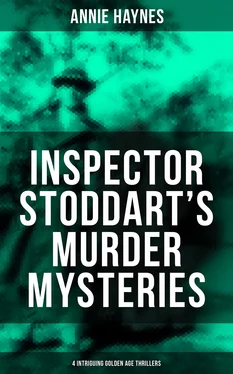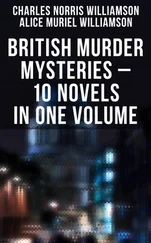"Tea, as soon as you can, Downes, please," Iris said as she turned into the drawing-room. "And plenty of sandwiches! Now, Mr. Wilton, I am terribly house-proud. What do you think of my abode?"
"I think it perfectly charming," Wilton replied truthfully as he glanced round. He had rarely seen a more restful-looking room. The walls were of a pale grey, the lines unbroken, save that over the high, black mantelpiece there hung a watercolour seascape, a gem in its way, signed by a famous artist, and that between the two windows which were curtained with grey damask, exactly the colour of the walls, there was a long strip of tapestry in wonderful old colours, faded now. The middle of the floor was covered by an Aubusson rug, the predominant colour of which was a subdued rose. There was not much furniture. A couple of wide, deep arm-chairs stood one on each side of the fireplace, in which, springlike as was the weather, there burned a small clear fire.
Further back there was a luxurious-looking Chesterfield, and against the wall there was a pair of spindle-legged, straight-backed chairs, quite evidently more for ornament than for use. A copper bowl on a small, solid-looking table held a wealth of roses, deepest damask, pink La France, glowing orange-golden William Alan Richardson. The rich damask of the chairs and cushions matched the curtains, and the only ornaments were of white china.
There was one curious omission, there were neither books nor papers about. The only sign of any occupation in which Miss Houlton could possibly indulge was an untidy pile of needlework thrust almost entirely out of sight behind one of the cushions of the Chesterfield.
Wilton's masculine eyes were not experienced enough to recognize a partly made jumper.
Iris drew one of the inviting looking chairs forward.
"You look fagged to death, Mr. Wilton. Now, just put yourself back in that and don't talk until the tea comes."
Wilton felt no desire to be disobedient. He had not realized how tired he was until he laid his head back against the cool-looking damask.
Iris sat down opposite, crossing her slim legs in their silk stockings. She threw aside her hat and Wilton could not help admiring the shape of her small head. Her hair was shingled, and waved round her temples in tiny, bewitching curls.
They had not long to wait. The maid brought in a huge copper tray on a tripod and placed it beside Iris. It contained a dainty tea equippage, a plate of cakes, a large dish of sandwiches, another of fruit, and a jug of golden cream.
When she had departed, Iris brought up a small table. Wilton noticed with satisfaction that it was not one of the gimcrack ones, usually associated with women's rooms, but stood firmly on straight wooden legs.
"No, no! sit still! I know how tired you used to get in the old days at Dr. Bastow's," she said, giving him a little push back when he moved to help her.
"Two lumps of sugar and plenty of cream, isn't it? I have brought tea often enough to you in the surgery, you know."
"You have, haven't you?" Wilton assented. "Not that we got much cream, did we?"
"No." Miss Houlton drew her lips in.
She did not speak again until she had given Wilton his tea, and put the sandwiches beside him; then she said slowly:
"No, Hilary Bastow wasn't much of a house-keeper, was she? But that will not matter. Sir Felix Skrine has plenty of money for housekeepers."
There was dead silence for a minute. Wilton was stirring his tea. He went on stirring it, though every drop of blood in his body seemed to have flown to his face, in reality, his brown skin was not a degree deeper in colour, and when he spoke his voice was perfectly steady.
"You mean—?"
"That Lady Skrine will not need to be a good housekeeper. Isn't it obvious?" Iris finished with a laugh.
Wilton drew his dark brows together. Iris Houlton was saying this purposely; she was quick-witted enough. She must have known how matters stood between Hilary and himself.
"Why do you say that?" he asked quietly. "I am sure you must know that I am engaged to Miss Bastow."
Iris glanced at him in a curious, sidelong fashion. Then she gave a little laugh that somehow did not sound natural.
"No, indeed! I did suspect a little tendresse at one time. But when I went to say good-bye to Hilary, I found Sir Felix Skrine there, and I quite gathered—"
"You gathered what?"
Iris laughed again. She got up and moved the tea-things in an aimless way.
"Oh, well, of course, now that you tell me that things are definitely settled, I realize that I must have been mistaken in thinking I saw—"
"What did you think you saw?" Wilton's tone denoted that his patience was becoming exhausted.
"Oh, nothing, nothing!" Iris said hurriedly. "Didn't I tell you that I must be mistaken? Sir Felix is Hilary's godfather, isn't he? I expect many girls are very fond of their godfathers, don't you?"
"I don't know. I have had no experience of the relationship," Wilton said curtly.
In his heart, he was inclined to resent the use of his fiancée's Christian name. He finished his tea and set the cup on the table. Then he went over and stood beside Miss Houlton.
"Of course you did not see anything, that is understood. But what did you think you saw?"
"Oh, really, I don't know." The tea-cups rattled as she moved them. "Really I can't tell you anything while you stand over me like that, Mr. Wilton. You might be Sir Felix Skrine himself. Do sit down and have some more tea or I shall not talk to you at all."
"I have only a few minutes to spare," Wilton said, glancing at his watch. "I've just remembered that I have an appointment."
Iris's little teeth bit sharply into her underlip.
"Well, sit down for just those two or three minutes. And now that we are comfortable again I will tell you that I didn't really see anything. I just thought I heard rather a suspicious sound—a sort of rustling you know, and—and something else," with a faint smile. "And when I did get in, they were standing a long way apart, and I always think myself—well, that that looks rather suspicious, don't you?" with a demure glance at him from beneath her lowered eyes. "But, really, I don't suppose it meant anything. It couldn't, of course, if she's engaged to you. I expect Sir Felix was just being—er—godfatherly."
"Probably!"
Wilton's tone was final and non-committal. Already he was regretting having entered into any sort of discussion of Hilary with Iris Houlton.
"Have you heard of this latest development in the Bastow Murder Case?" he asked abruptly. Miss Houlton had just taken up the tea-pot. Her fingers grew suddenly rigid as she clasped the handle.
"No, I haven't heard anything. I hate thinking about murders."
"One can hardly help thinking about a murder when the victim is some one you have known," Wilton rejoined.
Iris Houlton tossed her head. On her cheeks the rouge showed rose-red, but her voice was firm.
"I wasn't so very fond of Dr. Bastow. He was a cross old thing. I didn't think you liked him either. I heard you both talking pretty loudly in the consulting-room the day he was murdered. It sounded to me as if you were quarrelling."
"Well, we were not," Wilton said repressively.
"Well, folks can only talk about what they know," returned Iris, some of her London polish dropping off and a tiny trace of what sounded like a Midland accent peeping out. "But what was this development you were talking about?"
"It is in all the midday papers."
"Never read them," Iris interrupted, "unless I mean to put a bit on a horse, and want to spot the winner."
Wilton ignored the remark. "A pistol has been found among some bushes in Rufford Square. It is supposed to be the one with which Dr. Bastow was shot."
"Rufford Square!" Iris repeated thoughtfully. "Yes, he might go back through Rufford Square, though it's a bit out of the way."
Читать дальше












